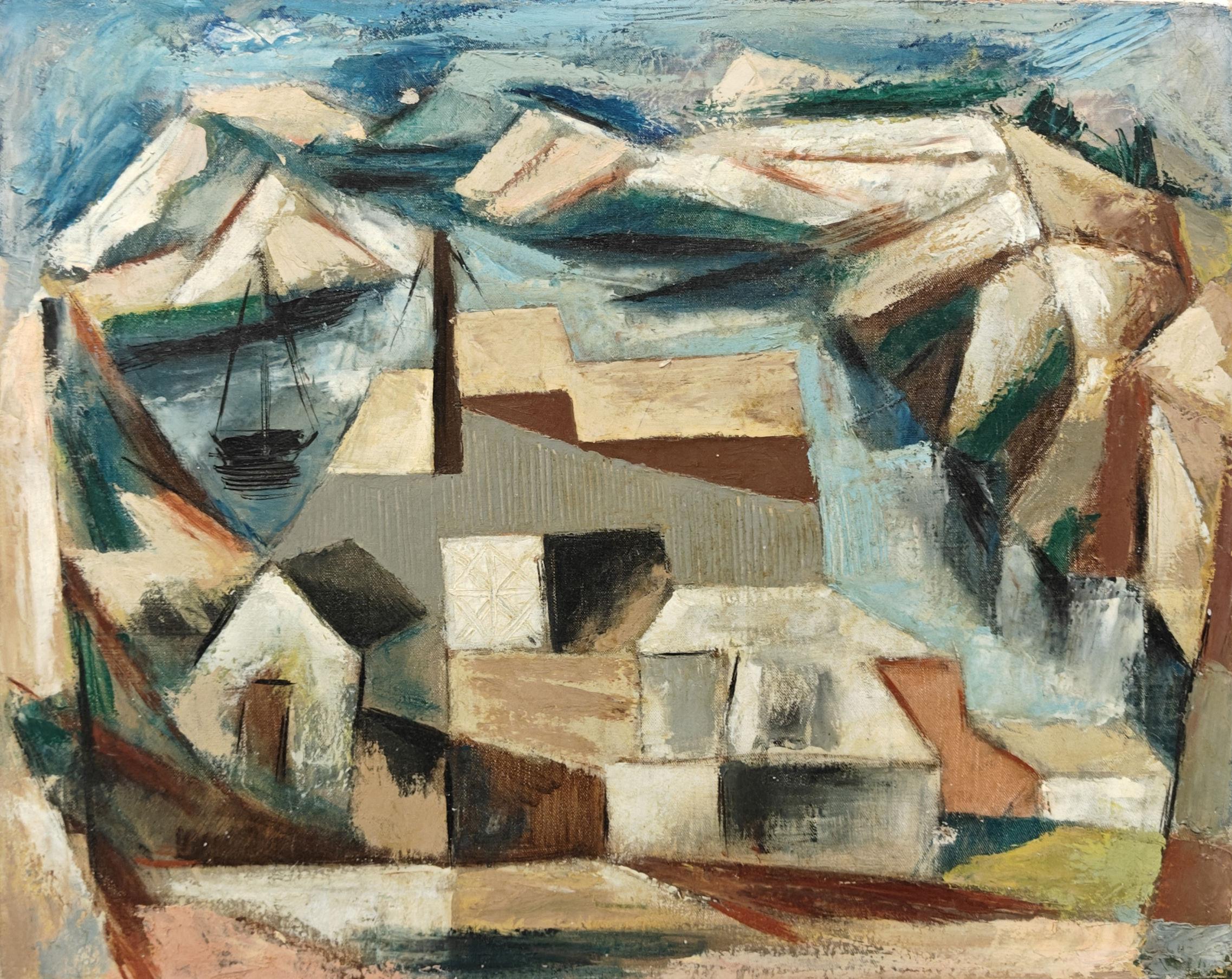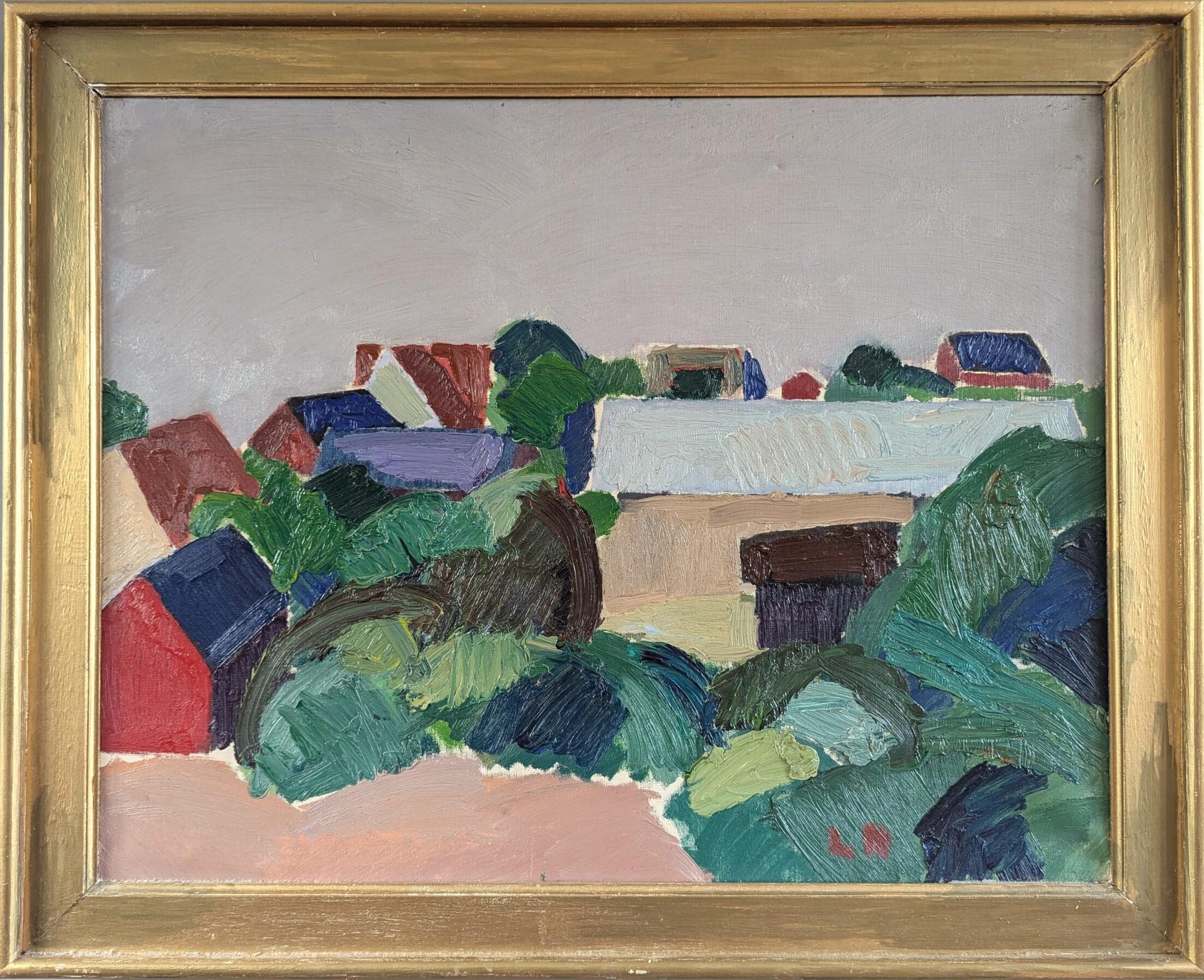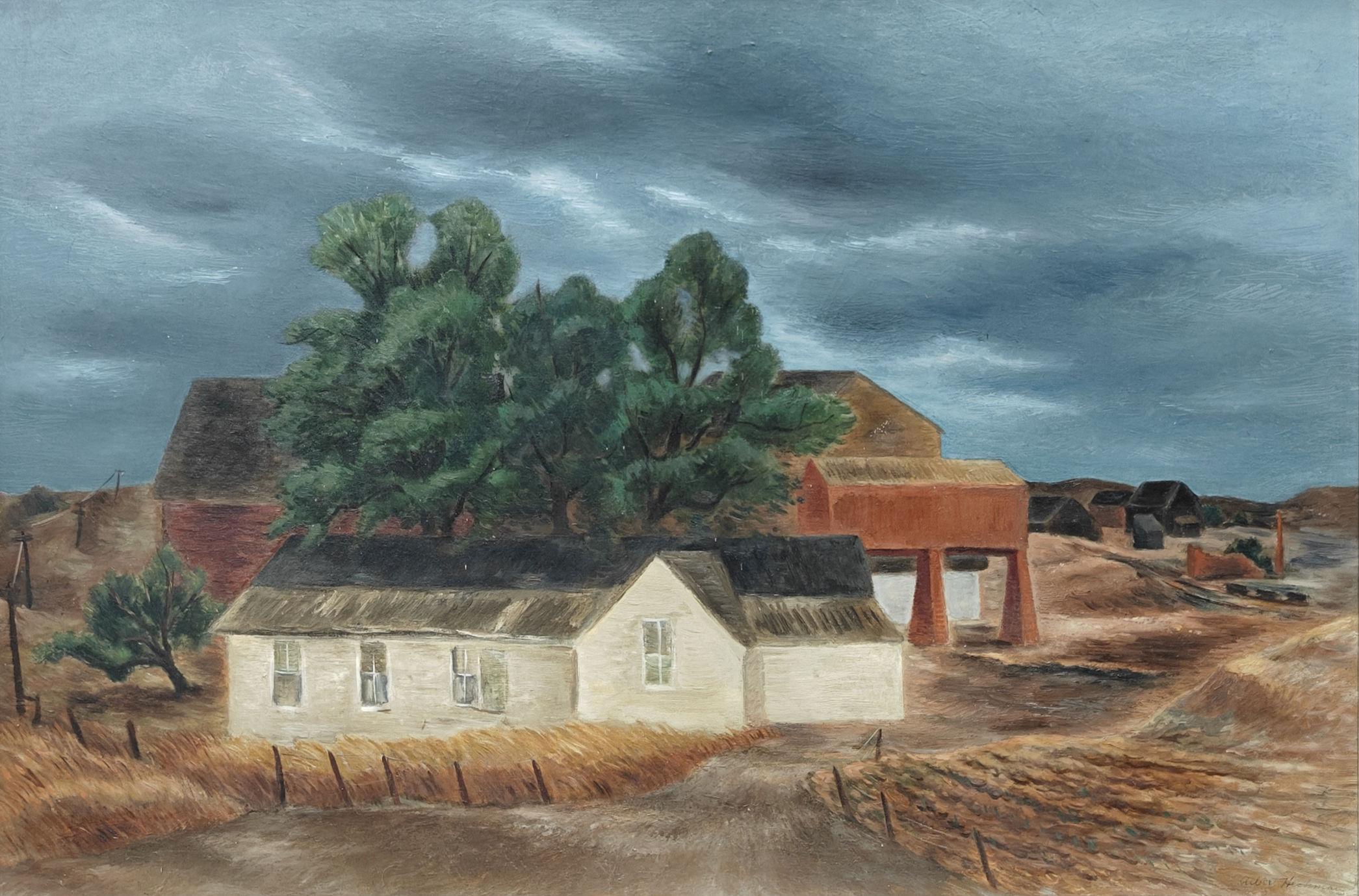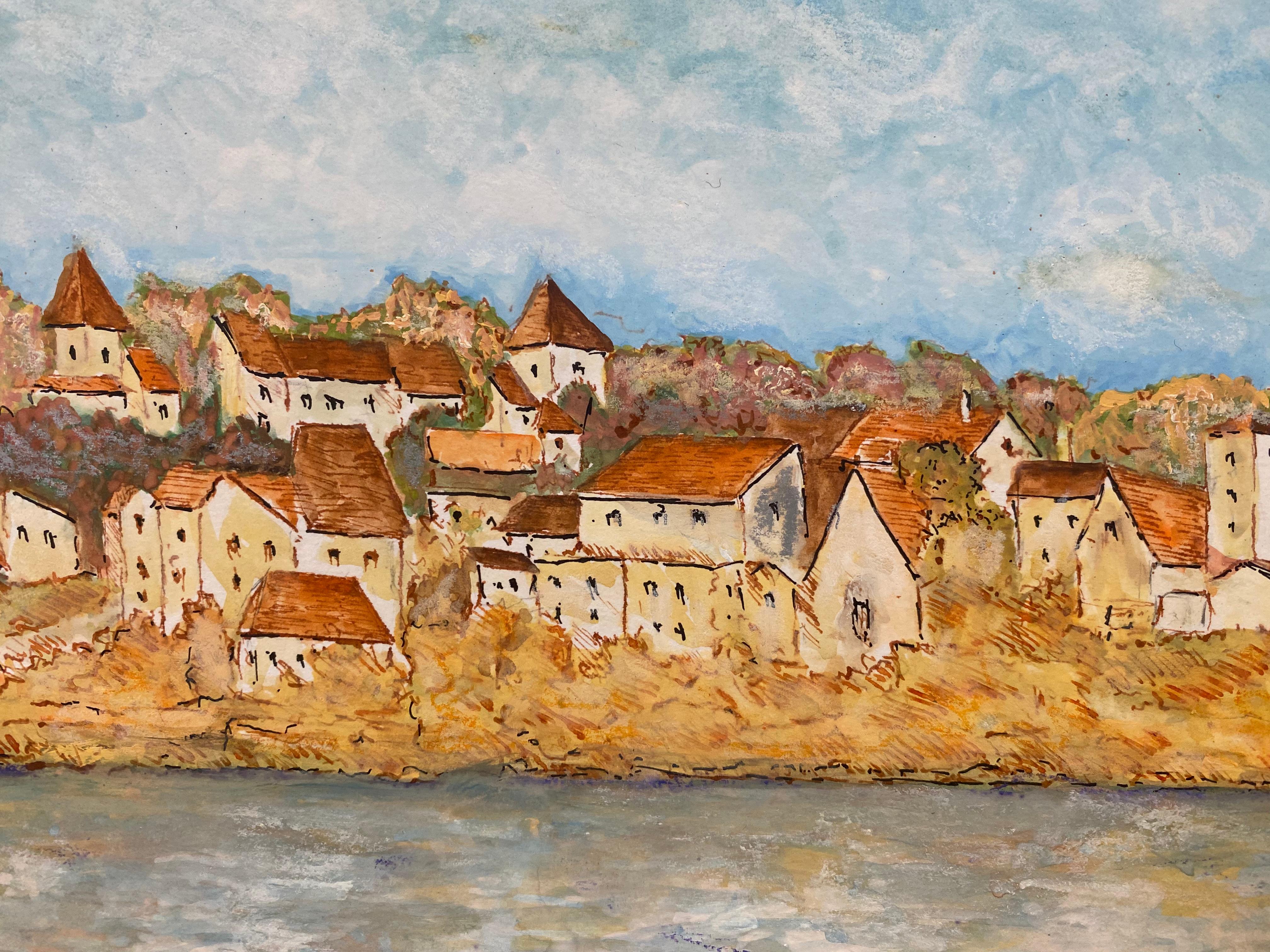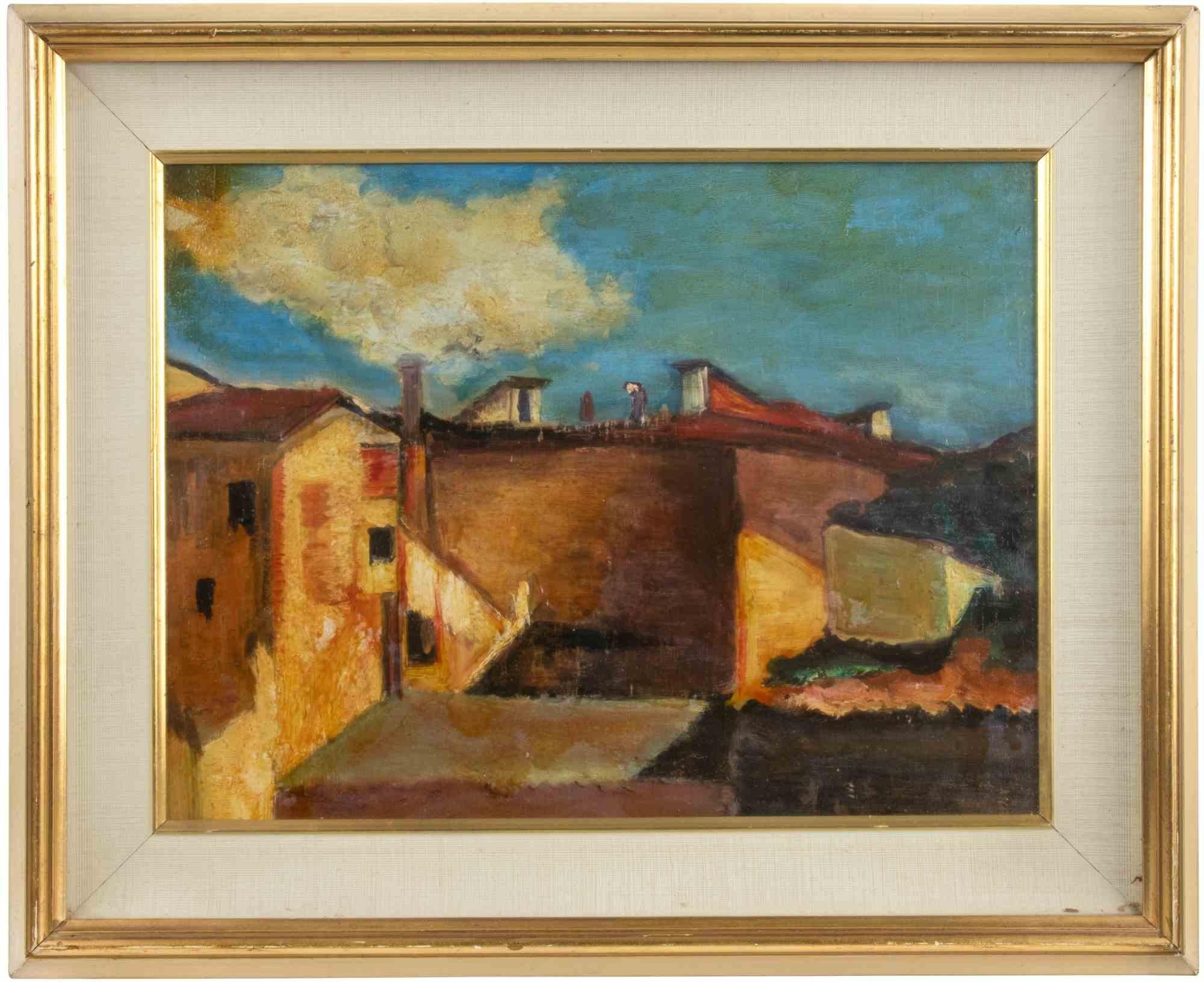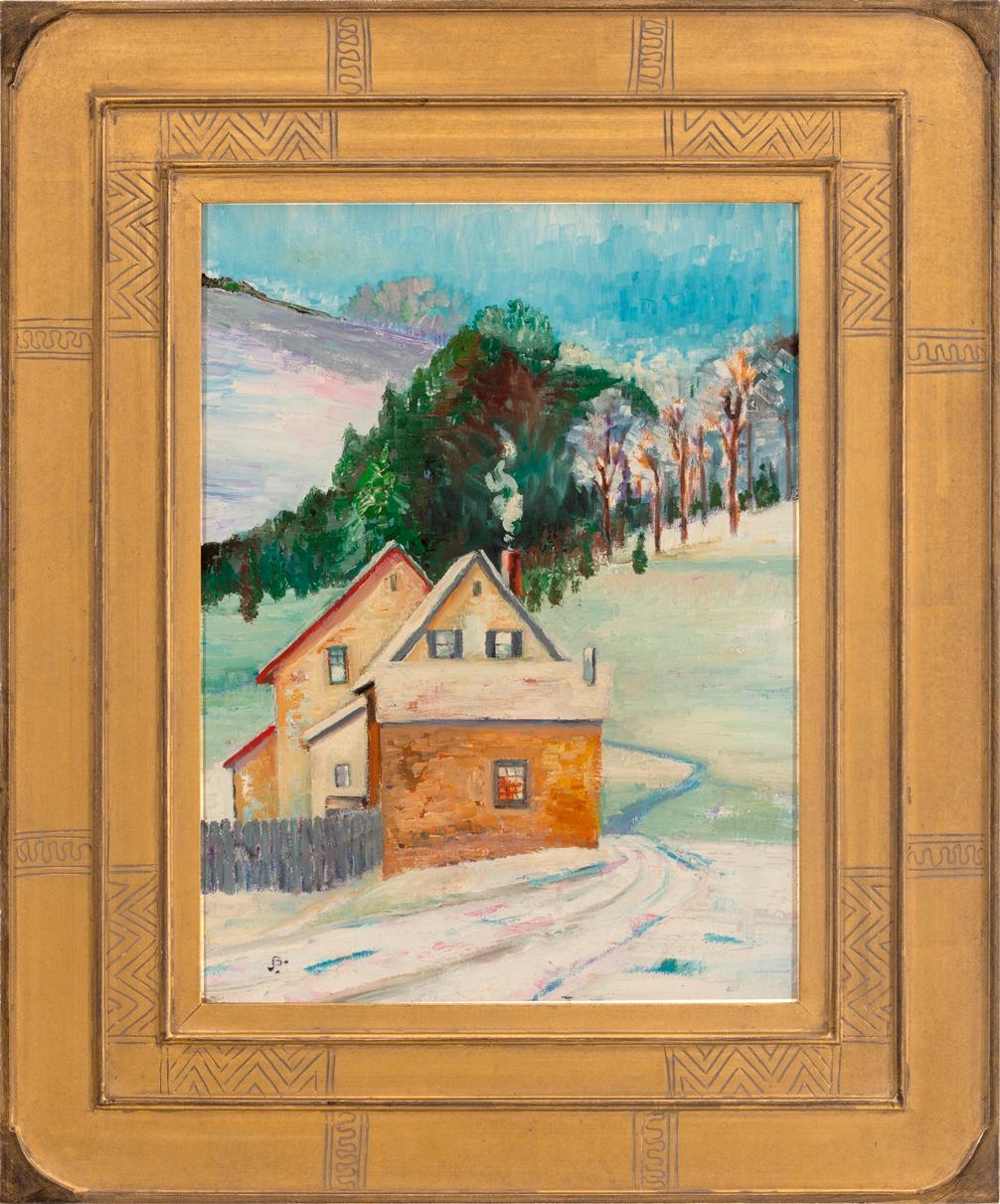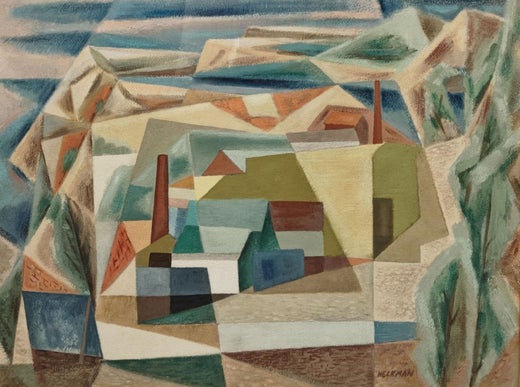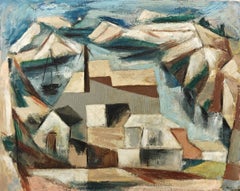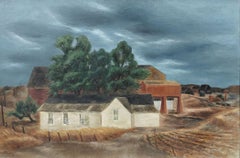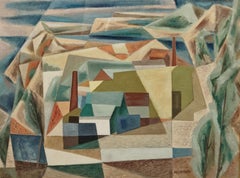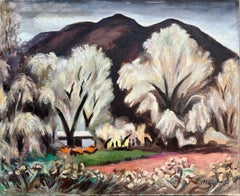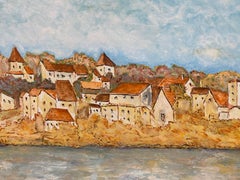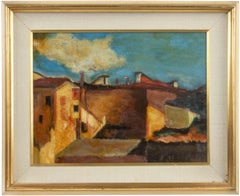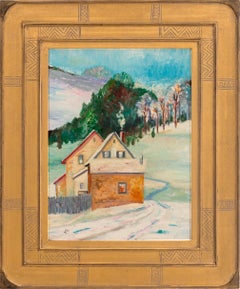Items Similar to "Cluster of Houses near Woodstock" Albert Heckman, American Modernist Landscape
Want more images or videos?
Request additional images or videos from the seller
1 of 10
Albert Heckman"Cluster of Houses near Woodstock" Albert Heckman, American Modernist Landscapecirca 1940s
circa 1940s
$4,750
£3,607.03
€4,131.90
CA$6,745.16
A$7,378.18
CHF 3,857.50
MX$88,872.25
NOK 48,213.36
SEK 45,482.53
DKK 30,844.20
About the Item
Albert Heckman
Cluster of Houses near Woodstock
Signed lower right
Oil on canvas
10 x 14 inches
Albert Heckman was born in Meadville, Western Pennsylvania, 1893. He went to New York City to try his hand at the art world in 1915 after graduating from high school and landing a job at the Meadville Post Office. In 1917, at the age of 24, Heckman enrolled part-time in Teachers' College, Columbia University's Fine Arts Department to begin his formal art education. He worked as a freelance ceramic and textile designer and occasionally as a lecturer at the Metropolitan Museum of Art. In the early 1920s, at the age of almost 30, he graduated with a Bachelor of Arts degree from Columbia Teachers College. He was especially impacted by his instructor at Columbia, Arthur Wesley Dow.
After graduating, he was hired by the Teachers' College as a Fine Arts instructor. He stayed with Columbia Teachers' College until 1929, when he left to attend the Leipzig Institute of Graphic Arts in Leipzig, Germany. Isami Doi (1903-1965), who was born in Hawaii, was arguably his most impressive student at Columbia. Doi is now regarded as one of the most prominent artists hailing from Hawaii. Heckman became an active member and officer of the Keramic Society and Design Guild of New York in the 1920s as part of his early commercial art career. The Society's mission was to share knowledge and showcase textile and ceramic design exhibits.
In 1922, Heckman married Florence Hardman, a concert violinist. Mrs. Heckman's concert schedule during the 1920s kept Albert and Florence Heckman apart for a significant portion of the time, but they spent what little time they had together designing and building their Woodstock, New York, summer house and grounds. A small house and an acre of surrounding land on Overlook Mountain, just behind the village of Woodstock, were purchased by Albert and Florence Heckman at the time of their marriage. Their Woodstock home, with its connections, friendships, and memories, became a central part of their lives over the years, even though they had an apartment in New York City.
Heckman's main artistic focus shifted to the house on Overlook Mountain and the nearby towns and villages, Kingston, Eddyville, and Glasco. After returning from the Leipzig Institute of Graphic Arts in 1930, Mr. Heckman joined Hunter College as an assistant professor of art. He worked there for almost thirty years, retiring in 1956. Throughout his tenure at Hunter, Mr. Heckman and his spouse spent the summers at their Woodstock residence and the winters in New York City. They were regular and well-known guests at the opera and art galleries in New York. Following his retirement in 1956, the Heckmans settled in Woodstock permanently, with occasional trips to Florida or Europe during the fall and winter. Mr. Heckman's close friends and artistic career were always connected to Woodstock or New York City. He joined the Woodstock art group early on and was greatly influenced by artists like Paul and Caroline Rohland, Emil Ganso, Yasuo Kuniyoshi, Andre Ruellan, and her husband, Jack Taylor.
Heckman operated a summer art school in Woodstock for several years in the 1930s with support from Columbia University, where these and other Woodstock artists gave guest lectures. The Potter's Shop in New York City hosted Mr. Heckman's first art show in December 1928. The exhibit received some positive reviews from critics. The American Institute of Graphic Arts chose the plate of "Wehlen, Saxony" as one of the "Fifty Prints of the Year in 1929." There were sixteen etchings displayed. The remaining plates depicted scenes in Saxony, Germany, while five of the plates were based on scenes in Rondout, New York.
Heckman started switching from etching to black and white lithography by the early 1930s. A lifelong admirer of Heckman's artwork, Mr. Gustave von Groschwitz organized a significant exhibition of Heckman etchings and lithographs at the Ferargil Gallery in New York City in 1933. The exhibition traveled to the Stendahl Galleries in Los Angeles (May 1933), the Charles Lessler Gallery in Philadelphia (May 1933), J.L. Hudson in Detroit (June 1933), and Gumps in San Francisco (July 1933). Together with his early etchings, the exhibition featured brand-new black and white lithographs depicting scenes in and around Woodstock as well as "A View from Tudor City," a black and white lithograph of a scene of 42nd Street in New York City. The exhibit was briefly mentioned in the New York Times and on April 23, 1933: "Mr. Heckman's work is strong and original as witness the "Rondout Bridge" etching which is scarcely more than an angle and reverse curves done with great sweep."
In 1935, von Groschwitz again arranged for a Heckman exhibition at the Ferargil Gallery. The exhibition consisted of black and white lithographs and pen and pencil drawings. The Herald Tribune wrote of these works, "His studies of trees drawn with lyrical feeling are notable." Despite modest sales and comparatively positive reviews from Times and Tribune critics, Mr. Heckrnan's formal one-man shows came to an end with the second exhibit at the Ferargil Gallery. He was to limit himself to showcasing individual pieces at both domestic and international exhibitions following his 1935 Ferargil Show.
Gertrude Vanderbilt Whitney was a significant influence on the Woodstock art scene in the early 1930s, first through her Greenwich Village Studio Club and then through the Whitney to promote American contemporary art. Mr. Heckman knew Herman More, the curator of the Whitney Museum, and Juliana Force, its first director, both of whom lived in Woodstock. From the First Biennial Exhibition of American Sculpture, Watercolor and Prints in December 1933 to the annual Exhibition of Sculpture, Watercolor and Drawings in 1956, Mr. Heckman displayed his work at Whitney exhibitions for nearly 25 years, in part because of these connections. Mr. Heckman' s major lithographs and prints made during the 1930s include the black and white lithographs "Bridge at Poughkeepsie," "Loading Lumber," “Oil Yards at Rondout," "Car Barns at Kingston”, “Old Locks at Eddyville”, "Crossroads," "Stoney Hollow Railroad Station, "Rip Van Winkle Bridge," "Sudden Rain," and "Deserted Village”. In addition to his participation at the Whitney during the 1930's, Heckman presented lectures, using his work for illustrative purposes, at several colleges and universities on the object of etching and lithography. He actively participated in the Federal Art Projects during the 1930s Depression and created "Sudden Rain" and "Stoney Hollow Railway Station" as part of these initiatives. His black and white lithographs "Wind and Rain" and "Windblown Trees," as well as the roulette drypoint "Deserted Village," were featured in the first catalogues produced by the Associated American Artists, an organization of which Heckman was a founding member.
Heckman’s style had matured by the 1930s, transitioning from his early stiff etchings to more poetic black and white lithographs and drawings. He switched from etchings and black-and-white lithographs, which had been his primary mediums, to oils and watercolors in the late 1930s and early 1940s. Heckman's oil painting, "Eddyville, New York," was displayed in the Carnegie Institute's October–December 1941 Directions in American Painting exhibit in Pittsburgh. In 1942, his oil painting "Glasco Landscape" was displayed in the Metropolitan Museum of Art's Artists for Victory: An Exhibition of Contemporary American Art. Heckman finished a number of watercolor paintings of scenes in the Woodstock and Kingston, New York, areas in the 1940s.
In the 1950s, he painted a series of abstract watercolor designs that would serve as the foundation for a number of color lithographs. The Cincinnati Art Museum's Curator of Prints, Gustave von Groschwitz, began a series of international color lithography exhibitions in the 1950s. The color lithograph "Fruit Forms," which was displayed at the Whitney's Annual Exhibition of Contemporary American Sculpture, Watercolor and Prints in January 1937, is currently part of the Whitney permanent collection.
In 1958, Heckman retired from Hunter College, and the Heckmans relocated from New York City to Woodstock as their permanent residence. He mostly created abstract designs in oils, watercolors, and inks while he was retired. He didn't have many exhibitions in the 1960s. Appropriately, his final public display took place at an exhibition honoring the 50th anniversary of the Woodstock Artists Association in Woodstock, New York. The lithographer, painter, etcher, and teacher Albert Heckman cherished Woodstock and New York. With the intention of preserving the Woodstock art scene and way of life that he and his wife, Florence, had helped to create, he left money to the Woodstock Art Association in his will. He is buried in the Artists' Cemetery in Woodstock, New York, alongside his wife, Florence, after passing away in Kingston, New York, in February 1971.
- Creator:Albert Heckman (1893-1971, American)
- Creation Year:circa 1940s
- Dimensions:Height: 15 in (38.1 cm)Width: 19.5 in (49.53 cm)
- More Editions & Sizes:Unique workPrice: $4,750
- Medium:
- Movement & Style:
- Period:
- Condition:
- Gallery Location:New York, NY
- Reference Number:1stDibs: LU1841216777962
Albert Heckman
Born in Meadville, Pennsylvania, Heckman came to NYC in 1915 and divided his time between there and Woodstock for the rest of his life except for 1929, when he studied in Leipzig. Married to concert violinist Florence Hardeman. Position: teacher, Hunter College, 1930-58; Teachers College Summer School, Woodstock, 1930s. Author: Paintings of Many Lands and Ages. He was a member of the Woodstock Art Association; and was also part of the Works Progress Administration Federal Arts Program in New York City, doing etching and block printing. He was influenced by Cubism and Expressionism.
About the Seller
5.0
Platinum Seller
Premium sellers with a 4.7+ rating and 24-hour response times
Established in 2022
1stDibs seller since 2022
122 sales on 1stDibs
Typical response time: <1 hour
- ShippingRetrieving quote...Shipping from: New York, NY
- Return Policy
Authenticity Guarantee
In the unlikely event there’s an issue with an item’s authenticity, contact us within 1 year for a full refund. DetailsMoney-Back Guarantee
If your item is not as described, is damaged in transit, or does not arrive, contact us within 7 days for a full refund. Details24-Hour Cancellation
You have a 24-hour grace period in which to reconsider your purchase, with no questions asked.Vetted Professional Sellers
Our world-class sellers must adhere to strict standards for service and quality, maintaining the integrity of our listings.Price-Match Guarantee
If you find that a seller listed the same item for a lower price elsewhere, we’ll match it.Trusted Global Delivery
Our best-in-class carrier network provides specialized shipping options worldwide, including custom delivery.More From This Seller
View All"Cubist Landscape" Albert Heckman, American Modernism, Woodstock, Earth Tones
By Albert Heckman
Located in New York, NY
Albert Heckman
Cubist Landscape
Oil on canvas
16 x 20 inches
Albert Heckman was born in Meadville, Western Pennsylvania, 1893. He went to New York City to try his hand at the art w...
Category
1940s American Modern Figurative Paintings
Materials
Canvas, Oil
"Glasco Landscape" Albert Heckman, circa 1940 New York Modernist Landscape
By Albert Heckman
Located in New York, NY
Albert Heckman
Glasco Landscape, circa 1940
Signed lower right
Oil on canvas
25 1/4 x 39 1/2 inches
Albert Heckman was born in Meadville, Western Pennsylvania, 1893. He went to New York City to try his hand at the art world in 1915 after graduating from high school and landing a job at the Meadville Post Office. In 1917, at the age of 24, Heckman enrolled part-time in Teachers' College, Columbia University's Fine Arts Department to begin his formal art education. He worked as a freelance ceramic and textile designer and occasionally as a lecturer at the Metropolitan Museum of Art. In the early 1920s, at the age of almost 30, he graduated with a Bachelor of Arts degree from Columbia Teachers College. He was especially impacted by his instructor at Columbia, Arthur Wesley Dow.
After graduating, he was hired by the Teachers' College as a Fine Arts instructor. He stayed with Columbia Teachers' College until 1929, when he left to attend the Leipzig Institute of Graphic Arts in Leipzig, Germany. Isami Doi (1903-1965), who was born in Hawaii, was arguably his most impressive student at Columbia. Doi is now regarded as one of the most prominent artists hailing from Hawaii. Heckman became an active member and officer of the Keramic Society and Design Guild of New York in the 1920s as part of his early commercial art career. The Society's mission was to share knowledge and showcase textile and ceramic design exhibits.
In 1922, Heckman married Florence Hardman, a concert violinist. Mrs. Heckman's concert schedule during the 1920s kept Albert and Florence Heckman apart for a significant portion of the time, but they spent what little time they had together designing and building their Woodstock, New York, summer house and grounds. A small house and an acre of surrounding land on Overlook Mountain, just behind the village of Woodstock, were purchased by Albert and Florence Heckman at the time of their marriage. Their Woodstock home, with its connections, friendships, and memories, became a central part of their lives over the years, even though they had an apartment in New York City.
Heckman's main artistic focus shifted to the house on Overlook Mountain and the nearby towns and villages, Kingston, Eddyville, and Glasco. After returning from the Leipzig Institute of Graphic Arts in 1930, Mr. Heckman joined Hunter College as an assistant professor of art. He worked there for almost thirty years, retiring in 1956. Throughout his tenure at Hunter, Mr. Heckman and his spouse spent the summers at their Woodstock residence and the winters in New York City. They were regular and well-known guests at the opera and art galleries in New York. Following his retirement in 1956, the Heckmans settled in Woodstock permanently, with occasional trips to Florida or Europe during the fall and winter. Mr. Heckman's close friends and artistic career were always connected to Woodstock or New York City. He joined the Woodstock art group early on and was greatly influenced by artists like Paul and Caroline Rohland, Emil Ganso, Yasuo Kuniyoshi, Andre Ruellan, and her husband, Jack...
Category
1940s American Modern Figurative Paintings
Materials
Canvas, Oil
"Cubist Landscape" Albert Heckman, American Modernist, Fractured Landscape
By Albert Heckman
Located in New York, NY
Albert Heckman
Cubist Landscape
Signed lower right
Oil on canvas
21 3/4 x 30 inches
Albert Heckman was born in Meadville, Western Pennsylvania, 1893. He went to New York City to tr...
Category
1940s American Modern Figurative Paintings
Materials
Canvas, Oil
"Bearsville, New York" Georgina Klitgaard, Modernist New York Wooded Landscape
By Georgina Klitgaard
Located in New York, NY
Georgina Klitgaard
Bearsville, New York
Signed lower right
Oil on canvas
26 1/4 x 32 inches
Georgina Klitgaard’s art has sometimes gotten lost in the critical propensity to assign ...
Category
Early 20th Century American Modern Figurative Paintings
Materials
Canvas, Oil
"Shanties in the Bronx, New York" Bumpei Usui, Japanase-American City Landscape
Located in New York, NY
Bumpei Usui
Shanties in the Bronx, 1933
Signed lower right
Oil on canvas
14 x 20 inches
Provenance:
The artist's estate
Salander O'Reilly Galleries, New Y...
Category
1930s American Realist Landscape Paintings
Materials
Canvas, Oil
"Manayunk" Walter Emerson Baum, Pennsylvania Impressionist Landscape of Manayunk
By Walter Emerson Baum
Located in New York, NY
Walter Emerson Baum
Manayunk, 1953
Signed and dated lower right; titled and dated on the reverse
Oil on board
12 x 14 inches
Walter Baum was born December 14, 1884 in Sellersville,...
Category
1950s American Impressionist Figurative Paintings
Materials
Oil, Board
You May Also Like
Mid-Century Modern Vintage Abstract Landscape Oil Painting - Hillside Houses
Located in Bristol, GB
HILLSIDE HOUSES
Size: 66.5 x 82 cm (including frame)
Oil on canvas
A mid-century modernist painting presents a vibrant yet soothing interpretation of houses by a hillside, depicted ...
Category
Mid-20th Century Modern Landscape Paintings
Materials
Oil, Canvas
1950's French Modernist/ Cubist Painting - French Houses On Hill
By Bernard Labbe
Located in Cirencester, Gloucestershire
French Landscape
by Bernard Labbe (French mid 20th century)
original watercolour/ gouache on artist paper, unframed
size: 13.75 x 19 inches
condition: very good and ready to be enjoy...
Category
Mid-20th Century Modern Landscape Paintings
Materials
Watercolor, Gouache
$520 Sale Price
52% Off
Landscape with Houses - Painting by Gino Marzani - mid-20th century
Located in Roma, IT
Landscape with houses is a modern artwork realized by Gino Marzani in the mid-20th century.
Mixed colored oil painting
Hand signed by the artist on the back.
Includes frame
Category
Mid-20th Century Modern Figurative Paintings
Materials
Paper, Oil
"Group of Old Houses, Buckingham"
By Joseph Barrett
Located in Lambertville, NJ
Illustrated in "Joseph Barrett, The Prime Years 1970s - 1990s", pg. 64, plate #075.
Jim’s of Lambertville is proud to offer this artwork by:
Joseph Barrett (1936 – )
Joseph B...
Category
Late 20th Century American Impressionist Landscape Paintings
Materials
Canvas, Oil
Hillside Barns
By Zygmund Jankowski
Located in Gloucester, MA
Zygmund Jankowski (1925–2009) painted traditional subjects with exuberant irreverence for traditional rules of color, composition, and perspective. He disparaged imitation and deligh...
Category
1980s Contemporary Landscape Paintings
Materials
Canvas, Oil
Price Upon Request
French Modernist 1960's Oil Painting Cubist Village Landscape
Located in Cirencester, Gloucestershire
The Village Landscape
The artist, Raymond Guidot (1935 - 2021) was a Parisian art historian, critique and teacher.
oil painting on board, unframed
board: 9 x 10.5 inches
stamped ve...
Category
Late 20th Century Cubist Landscape Paintings
Materials
Oil
$843 Sale Price
20% Off
